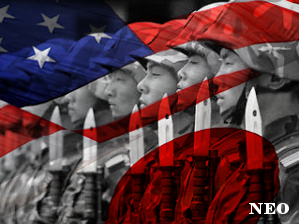
On July 6th, 2014, Shinzo Abe stated that Japan will create a special ministerial post. This person will be responsible for issues relating to the implementation of collective defense, the right to which the country received following the recent government acceptance of the corresponding resolution.
The Japanese government’s decision has one limitation – the Land of the Rising Sun’s armed forces can be used abroad only in collective operations, that is, only under the leadership of the U.S.’s high command, on its orders, and, it is possible, as a “primary expendable material.” It would be the height of folly for the U.S. government to approve the use of the descendants of Amaterasu in overseas operations under any other conditions.
American Minister of Defense Chuck Hagel welcomed the Japanese government’s decision. In a statement the other day Hagel said that the “new policy regarding collective self-defense […] will enable the Japan Self-Defense Forces to engage in a wider range of operations… .” According to him, this will make the U.S.-Japan alliance even more effective. I should think so! Now it’s possible to send the sons of Yamato even into Iraq and Afghanistan, and most importantly — it will be paid for by Japanese taxpayers.
However, that’s not all. In the Land of the Rising Sun, there is a very unfavorable demographic situation, even compared to European countries. This is well known. By 2060, the population of Japan may be reduced by up to 87 million people, 40% of them being retired. As to the accident at Fukusima’s impact on the demographics of the Land of the Rising Sun, we have yet to see. However, two or three military expeditions to somewhere in the Middle East will not at all make the Japanese nation healthier or more populated.
What are Japan’s military capabilities?
If the PRC (the world’s most powerful manufacturing economy) spent $119.5 billion on military expenses in 2013, then Japan in the same period spent $51 billion, with a multi-year economic recession and a massive removal of industrial capital abroad.
While Asian public opinion resents and remembers numerous war crimes by Samarai warriors, the Russian government is conducting active construction on the Iturup and Kunashiri islands. By 2015, a total of 150 objects should be operational. “This will be modern, fully self-contained military sites with a well-developed social infrastructure. In addition to military facilities, the projects provide for the construction of residential houses as well as socially significant cultural, leisure and sporting institutions”, a message by the East Military District stated. In addition, in the next two years Russia’s Pacific Fleet will grow by two “Mistral”-type helicopter carriers; Washington’s made a real scandal over the delivery of said helicopter carriers to president Hollande. But what else can the Kremin do?
The Peace Treaty between the Russian Federation and the Land of the Rising Sun has not yet been signed. It’s very curious that this circumstance for some reason concerns the Russian side more.
Why doesn’t this fact worry the descendants of the Samurai? Have they so completely acquired the spirit of Lev Tolstoy’s books that they are 100% sure the kind Russian soul will infinitely swallow all Japan’s militaristic steps? Yes, the Japanese government has a large friend across the ocean, which has been instilling in Tokyo a certain optimism. But there is a question here. If Tokyo is so confident in the unlimited power of their sovereigns from Washington, then why on earth does it ask the White House to confirm allied guarantees almost every time any Chinese mine-sweeper passes by the Senkaku archipelago?
The world itself is changing, but only the answer to the question “what do the gentlemen from Washington wish?” is not changing; as has been systematically demonstrated by Japanese prime ministers.
What was the response from some East Asian countries to Abe’s cabinet’s decision? China stated that the decision by the Japanese Government, which for the first time since the Second World War will allow Japanese troops to use force abroad, “could once again lure the country into a bloody nightmare”. This came in a statement by the agency “Xinhua.”
On 5th July, PRC chairman Xi Jinping, while visiting the Republic of Korea, in his speech to students at Seoul State University raised some of the historical problems between Japan and its neighbors. He said that Japan under the flag militarism waged a ruthless war against China and South Korea, annexed the Korean peninsula and occupied part of China, so the people of the two countries underwent terrible suffering. Xi Jinping stressed the joint actions by the two countries against militaristic Japan, pointing to the fact that both peoples shared the same fate and helped one another as much as they could.
If the DPRK’s position coincides with China’s position on some of the decisions by the Land of the Rising Sun (as evidenced by regular launches of North Korean short-range missiles in the sea of Japan), the United States’s military control over the Republic of Korea prevents it from joining the anti-Japan alliance: there’s an American military base in the RK.
Xi Jinping’s visit is not, of course, an invitation to South Korea to join a military alliance, but, at least, it is a clear demonstration of good feelings and gives food for thought to the ruling classes of the RK.
In conclusion, throughout all the feverish bustle of the building of military and political blocs, all the participants of the Pacific squabbles and first and foremost Japan would be better off focusing on peacefully settling long-time regional problems to the benefit of their peoples, rather than working on puffing up military agitation.
Constantine Penzev is a writer and historian and a columnist for the online magazine “New Eastern Outlook”.
